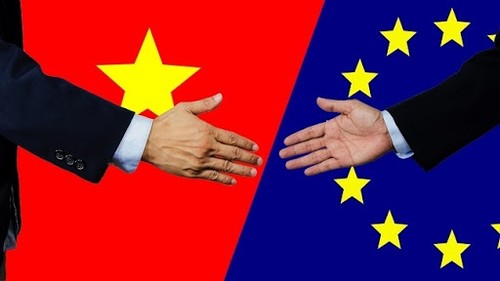 (Photo: thoibaotaichinhvietnam.vn) (Photo: thoibaotaichinhvietnam.vn) |
Once the EVFTA takes effect, the EU will eliminate import taxes on nearly 86% of tariff lines from Vietnam, increasing to 99% of tariff lines after 7 years. The rest of Vietnam’s export products will be liberalised via tariff quotas.
In return, Vietnam will remove 48.5% of tariff lines for EU goods in the first year, increasing to 92% of tariff lines after 7 years and more than 98% of tariff lines after a decade.
Deputy Foreign Minister Bui Thanh Son underscored the need for functional agencies to complete the necessary procedures to be submitted to the National Assembly for approval. He called for detailed plans to enable Vietnamese businesses to make full use of the opportunities and prepare for the challenges of the agreements.
If the National Assembly approves the deals at its May meeting and required legal procedures are completed by June, the EVFTA will take effect on July 1.
Luong Hoang Thai, Director of the Multilateral Trade Policy Department of the Ministry of Industry and Trade, said: “We need to ensure our policies to be in line with the new conditions created by this new-generation free trade agreement. In simple words, Vietnam should harmonize institution reform and administrative procedure reform towards improving competitiveness and making the most of the agreement’s opportunities. The Prime Minister has stressed the importance of policy and institution reform during the preparation for the EVFTA and EVIPA.”
The removal of 99% of tariff lines under the EVFTA will create more opportunities for Vietnam’s exports to the EU, but will also increase competition for the domestic market.
Vu Tien Loc, President of the Vietnam Chamber of Commerce and Industry, said: “Domestic companies must prepare for the new competition and do their best to improve their competitiveness instead of waiting for state subsidy. Our renewal and open-door process has proved that those who dare to accept competition, open the door, and give up subsidy early can develop strongly. These are practical lessons for the current integration process.”
In order to enter the European Union, a demanding market with the world’s highest standards, and enjoy its preferential tariffs, Vietnamese products must meet stringent conditions in quality, production process, and input materials.
Nguyen Thi Huyen, Director of the VinaSamex Company, which specialises in cinnamon and star-aniseed production and export, said that Vinasamex is ready for major export orders that will enjoy tariff reduction from 14% to 0% when the EVFTA takes effect.
“The EU is our target market. Since 2013 we have been developing value chains of material growing areas, production factories, and exports to foreign customers. The EU requires a lot of certifications, for example, in food safety, hygiene, and fair trade. To date we have already earned many international certifications,” said Huyen.